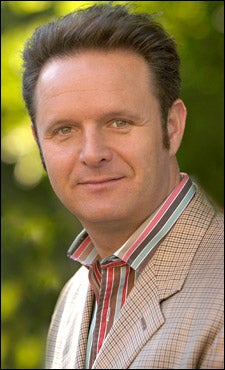A journalist, an expedition leader, a primatologist, and a survival expert walk into the African bush. No, it’s not the setup to a bad joke but, rather, the real-world premise behind Expedition, a series debuting on the History Channel May 31. In it, four handpicked adventurers (and total strangers) attempt to retrace journalist Henry Stanley’s seven-month 19th-century African trek to find the world’s most famous missing explorer, Scotsman David Livingstone. Only they’ve got┬Śduhn, duhn, DUHN┬Śjust 30 days to do it! Credit the prefab drama to the show’s creator, 48-year-old Mark Burnett. Nine years after Survivor, with prime-time staples like The Apprentice and Are You Smarter Than a Fifth Grader? to his credit, Burnett has earned giant ratings and plenty of scorn as the undisputed king of reality┬Śor “unscripted,” as he prefers to call it┬Śtelevision. So can he turn an epic expedition into epic television without relying on his shopworn reality-show formulas? Burnett says yes, pointing to his r├ęsum├ę for evidence of his adventure cred. A former British paratrooper, he created the Eco-Challenge adventure race in 1995, bringing it to television that same year. And in 18 seasons of Survivor, he’s pulled off shoots in some of the most remote places on the planet. He calls Expedition a return to these roots. “I love it,” he says. “It’s so great to put something on TV with redeeming qualities.”
Mark Burnett

OUTSIDE: You could have chosen any expedition in history. Why the search for David Livingstone?
BURNETT: Probably because a lot of Americans don’t really know the truth behind the story. But they know the quote, “Dr. Livingstone, I presume?”
So what is the truth?
Livingstone was so revered that his African porters carried his body back a thousand miles across Africa. Then his body was transported back to England. He was buried in Westminster Abbey, and it was the biggest state funeral in the history of the United Kingdom until Princess Diana. That shows you what [England] thought about this old Scottish guy. And the reason the Americans funded Stanley is because the owner of the New York Herald wanted to scoop Britain. It was almost like an F-you to Britain from America. “You’ve lost your most famous person? You’re kidding me. Americans are going to find him.” So sure enough, this guy finds him. I mean, tough, tough guy, Stanley.
Your stand-in for Stanley, the journalist Kevin Sites, gets lost in the first episode.
Not horribly lost, but it shows you how all the characters were on their own agenda. I got lost on Survivor: Africa once. You know what it is? You don’t pay attention. You take your mind off it for five minutes and everything looks the same, and suddenly you’re like, Fuck, where am I?
Are you really lost when you have a camera crew?
The crew is not allowed to stand in the way, and they don’t know the way. Now, if it went on too long and somebody is going to get really badly hurt or die, I’d send up a helicopter and we’d get them….But it’s not like being in the city, where you can call a cab. You’re really out there. It’s Africa. People get eaten every day by something.
With Survivor, you have the tribal council to build a story around. How do you build episodes around an expedition?
In Survivor, the people you get rid of are the ones who decide if you win. It’s a leadership game of strategy: How do I fire you and have you still love me? On this one, the storytelling device is: We know where we’re going, we’ll shoot everything, and stuff will come up.
But you hedged your bets by casting explorers who would rub each other the wrong way, right?
I’ve made 1,100 hours of unscripted television. You know what I’ve learned? What people tell you in casting, and then when the gun goes off and you’re actually out there, is different. It never works out as you’d think.
We seem to be in a postmodern era of exploration, where adventure is about retracing old adventures. Is real adventure dead?
Five years ago, I took my son when I was scouting Survivor in Fiji. I remember walking through the mountains, and my son was the first white child they had ever seen in the village. This was Fiji┬Śthe Fiji that people think of as just beaches and tourism. You can find adventure. You start going farther up the Rio Negro in Brazil, or the Amazon, where we shot Survivor. We had an anaconda come through tribal council one night.
You really do get around.
I don’t think you’re going to find a producer who has actually shot in more places than my company. There’s no way. We’ve done nine Eco-Challenges, 19 Survivors, and Expedition. You know the universal truth? Most of these remote people are very similar to each other, and it is us that have lost our way.
How so?
We are so focused on the end result. We go into meetings and it’s “OK, let’s get to the point.” I remember with the Eco-Challenge, going to a village in the Atlas Mountains of Morocco. They were harvesting these almond type of things, from the trees, and they stopped everything because we were visitors. Stopped and talked for hours. They never once said, “Guys, I’d love to talk to you, but I’ve got to go back to work.”
As a former paratrooper, are you interested in documenting war?
It’s just a very complicated thing, from a legality point of view. And would you cause a distraction and loss of life? But it’s interesting that you brought this up. When I look back in my soul about the parachute regiment, most of my daydreams┬Śthey’re never about carrying a weapon. They’re about being in the mountains and the beauty of the outdoors. That’s really where these shows came from: Me thinking, How can I do what I used to have a great time doing┬Śdriving across remote mountains, no travelers, no nothing, carrying a huge pack?
What about space travel?ÔÇłAt one point you were developing Destination Mir, trying to send a TV contestant up with the Russians.
I’ve always thought that the idea of an ordinary citizen having an opportunity to travel through space and look back at our planet┬Śthat would be incredible to watch. But it’s hard for governments to get out of their own way. At some point, you’ve just got to choose things that are actually doable. I’ve got to believe Richard Branson will find ways to let ordinary people see the planet and space.
Have you reserved a seat on one of his rockets?
No, I have not. My wife would have a lot to say about that.


